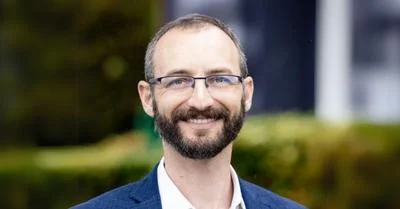Chancellor Gary S. May | Official website
Chancellor Gary S. May | Official website
With her natural warmth, Cali is out to make friends for herself and the UC Davis Police Department. At just 14 months old, the Labrador retriever is the newest and youngest member of the police department’s CORE, or Community Outreach and Engagement, Officer Program’s K-9 unit.
Her debut in September marked a new beginning for the police department’s K-9 unit and its contribution to a tiered response to policing on campus. Cali specializes in assisting with mental health and crises, making her the police department’s first specialized therapy dog for students, staff, and faculty. Other campuses are following in her paw prints.
“She just brings a boost of dopamine to our campus,” said her canine handler and CORE Officer Robert Sotelo, who has been working with Cali since she was just 5 months old. “Being part of the community is really important to us, and Cali just seems to know how to bring out the best in people.”
The CORE program provides an approachable way for the UC Davis community to interact with police officers as part of an effort to reimagine the perception of police presence on campus. Wearing casual uniforms or plain clothes, CORE officers assist with nonemergency issues by connecting and engaging with the community to provide necessary resources such as crime prevention, personal safety, and mental health support. CORE officers are also on call for non-imminent safety concerns like depression and substance abuse.
“I want to be recognized as a police officer, but I also want people to feel safe when they see me,” Sotelo said about his work in the CORE program.
“We know we don’t need to escalate situations that are already highly stressful and instead focus on creating a sense of security on campus,” he added. “If we deal with a crisis incident that requires police intervention, Cali is great at creating a calm, welcoming space to keep tensions low so we can do our job more effectively.”
Cali works closely with the UC Davis community, interacting most frequently with students, staff, and faculty. Unlike other canines trained in explosives detection and fieldwork, Cali has been training as a service animal since she was 8 weeks old. She is now an American Kennel Club certified therapy dog specializing in handling mental health crises, providing emotional support, and educating the community on mental health awareness.
Sotelo and Cali have formed a strong bond over their months together. On a typical day, she joins Sotelo for shift briefings at both the police department and UC Davis Fire Department.
Cali often visits departments needing breaks from hectic schedules and frequently meets medical staff at UC Davis Medical Center for self-care sessions. In her free time, she enjoys spending time with her family, playing fetch, and swimming.
During one encounter on campus walks through the arboretum up to three times daily, they were approached by a grieving woman who appreciated Cali's comforting presence. “In over 20 years in my career,” Sotelo said, “it was one of the most wholesome experiences I have ever been part of.”
Cali's work has inspired other UC campuses like UC Riverside, UC Merced, UC Santa Cruz—and even led her little sister Sandi joining UC San Diego Police Department—to start their own therapy dog programs.
“Cali is a major step in a progressive program to facilitate more care and attention to those we serve,” Sotelo stated. “We are progressively reimagining law enforcement perception on our campus without sacrificing safety.”
Cali has also built a strong relationship with Charlie—an older Labrador retriever retired from explosives detection—in their playful companionship around the station.
The best way to learn more about Cali is meeting her in person or following her adventures on Instagram @ucdpd_cali.
Shreya Kumar was an intern with News and Media Relations from July 2023 through June 2024.
___






 Alerts Sign-up
Alerts Sign-up